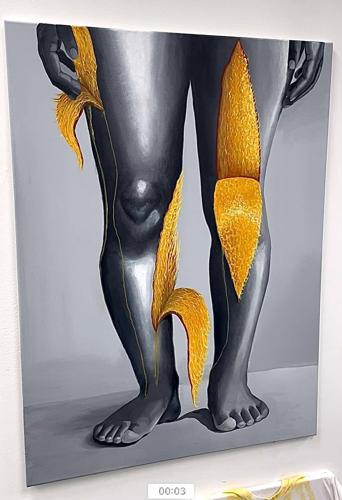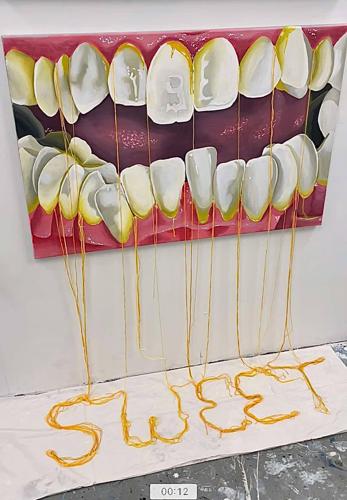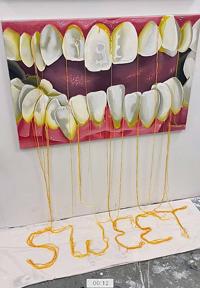In the messy, sticky beginnings of the mango season, Jasmine Beneby is reimagining what it means to be a woman in the Caribbean.
The 23-year-old painter is laying her Bahamian heritage at the doorstep of Florida State University through a bittersweet exhibit depicting the objectification of the Caribbean woman’s body.
Though crafted from a humble kit of house paint and string, Beneby’s art is far from simplistic.
In one art piece, flesh peels from a leg like the skin of an overripe mango on a hot summer day, giving way to plush mango flesh juicy enough to eat. In another, mango hair is stuck between hungry teeth, collapsing into a message that reads “SWEET”. There is a white t-shirt stained yellow from feasting on the tropical fruit, and a portrait that depicts thirsting mouths, yearning for the taste and affection of a lone mango.
Collectively, each brushstroke and carefully crafted prop is a love letter to women across the West Indies, peeling back the many layers of female identity.
Pieces in her exhibit, which went viral on social media, are part of a broader thesis project to be completed within her three-year master’s program.
Beneby said the idea was very experimental.
“I’m focusing on how to portray different aspects of the Caribbean woman’s identity through the use of mango,” she said.
“The first thing I immediately thought about was objectification because it’s really a topic that hits home, especially when you think about the term mango skin and how it’s used to describe lighter skinned women. I wanted to reclaim that term and use it to portray all Caribbean women regardless of skin tone because mango is one fruit that has so many different species, and it’s reflective of how many different women we have in the region.”
She said, “I’m trying to reshape this idea of the mango to portray all the different struggles and parts of our identity we go through from when we’re children to more mature women.
“I wanted to paint things that portrayed different parts of the Black woman’s body because I feel like it really is a big part of our identity.
“When people see they’ll be able to immediately recognize and understand because I feel like nobody really understands or recognizes our own bodies like ourselves, and we can really relate to the vulnerability of seeing our body parts on a canvas.”
Though her art pieces paint a picture of the female experience, Beneby said she enjoys the endless possibilities for interpretation. She expressed her desire for her work to resonate with women and girls of all ages.
“The exposure of young women to sexual things early on in life is something I’ve seen in our cultural background in The Bahamas,” she said. “It made me think of how mangos, when they’re not ripe, we put them in a brown paper bag.”
Beneby’s art career began when she was just a child.
In primary school, while other children were writing notes, she would doodle pictures in her notebooks, she said. Her proclivity for drawing drew the attention of her peers, so much so that other students began to make art requests.
In high school, Beneby chose to take art in place of her elective class, a decision that would only deepen her passion for the craft.
“I’ve been dabbling in art for years now,” she said. “I started off with painting portraits, I did a lot of commissioned works.”
Beneby attended University of The Bahamas, graduating with a dual degree in Psychology and Art last spring. During her undergraduate studies, she took a number of courses focused on gender studies.
Despite her lengthy tenure in the world of art, Beneby expressed shock at the widespread praise she received on social media after she posted pictures and videos of her creative mango exhibit.
She noted that since beginning her art program in Tallahassee, Florida, last fall, cultural barriers have been a trying issue.
In her academic cohort, Beneby is the only Black woman in her year, and the only Black Caribbean woman within the entire program.
Beneby said ethnic differences have led to the culturally complex visions behind her artwork being lost in translation. She shared that the mango exhibit was critiqued quite harshly by a team of mainly American artists before she had a chance to explain the concept.
“I’m covering topics that a lot of my professors and classmates are not familiar with, so I’m trying to navigate creating work that everybody globally will be able to understand,” she said. “In a sense, you kind of feel a little alone. You’re covering these ideas that you know, in your head, it makes sense, but other people aren’t fully getting it.”
Beneby added that the outpouring of support from both local and international communities was a much needed pick-me-up.
Now home for the summer, Beneby said she felt called to return to Nassau to interact with the local community, seeking further inspiration.
“I made it a point to come home this summer to get more research done and talk to people and hear a little from their background, maybe things I may have not been able to experience because of my age or personal background,” she said.
Beneby said at the end of her program, a final exhibit will take place at a museum, featuring all artwork completed within the degree.
She said her journey to the end is all about growth.
“I’m still at the beginning part of my research, but I see it going far, and I think I have a lot to discover with this topic.”
Commenting on the lack of resources and materials available for young artists studying in The Bahamas, Beneby said after completing her masters, she plans to return home to enrich the art community and run her own art studio.
“I want to be a professor,” she said.
“I want to be able to give back to the University of The Bahamas and be as encouraging as my professors were to other students who may be pursuing art and are feeling uncertain about how they’ll be able to live as an artist.
“I want to set up a program for troubled teens who can just come in and use art as an outlet. I know there’s a lot of anger and a lot of violence in The Bahamas, and I feel like it’s really misdirected.
“I feel like for those who are not good talkers, art is a great way to express feelings.”







(0) comments
Welcome to the discussion.
Log In
Keep it Clean. Please avoid obscene, vulgar, lewd, racist or sexually-oriented language.
PLEASE TURN OFF YOUR CAPS LOCK.
Don't Threaten. Threats of harming another person will not be tolerated.
Be Truthful. Don't knowingly lie about anyone or anything.
Be Nice. No racism, sexism or any sort of -ism that is degrading to another person.
Be Proactive. Use the 'Report' link on each comment to let us know of abusive posts.
Share with Us. We'd love to hear eyewitness accounts, the history behind an article.